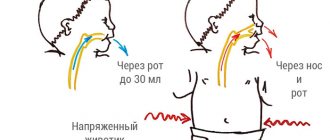Snoring is a loud, rough or harsh respiratory noise that occurs during sleep due to vibration of the back of the roof of the mouth. Children often experience disturbances at night (from 4% to 10%), ranging from snoring, difficult and restless breathing to apnea (pauses in breathing). This occurs against the background of increased resistance in the upper respiratory tract.
Many parents believe that nighttime snoring in a child is harmless, but this is not the case. The process itself can cause dangerous complications for the health of young children, causing hypoxia - insufficient oxygen supply to tissues and organs.
Causes of snoring in children
There are a number of reasons that predispose children to breathing problems during sleep:
- Low muscle tone in the muscles of the throat or tongue. Weakened muscles cause the tongue to drop back and the throat muscles to obstruct the airway.
- Excessive development of throat tissue. For example, large tonsils or overdeveloped adenoids (vegetations) are the cause of snoring in children. Obese people suffer from an increase in the size of these tissues. Cysts or tumors can also be factors that cause snoring.
- Excessive length of the soft palate and uvula. A large palate or uvula can narrow the passage between the nose and throat. Because the soft palate hangs over the entrance to the airway, it acts as an inflow valve, and when relaxed breathing occurs, it contributes to the sound of snoring.
- Nasal airway obstruction. If there is an obstruction or blockage in the nose, it is necessary to make an effort to inhale air. This creates an exaggerated emptiness in the throat, which turns into a collapse of part of the airway and pushes soft tissue towards the throat. This is why viral nasal infections can cause snoring in children who do not normally snore. This also explains the reason why some people only snore in the spring (pollen allergy).
- Deformation of the nasal septum. A common cause of airflow obstruction, which can cause nighttime snoring. Snoring can be caused by a cold or chronic allergies, as well as inflammation of the tonsils, leading to airway obstruction. Using antihistamines or other pills without first consulting a doctor before going to bed can also lead to the development of this problem.
To determine the cause of snoring in children, medical examinations of the nose, mouth, palate, throat and neck must be performed.
What is the danger of snoring in a child?
The very presence of snoring certainly indicates that during sleep air exchange is disrupted, the volume of air entering the lungs with breathing is significantly reduced, which means that a deficiency of oxygen entering the bloodstream from the lungs is formed, and therefore the respiratory function of every cell of the body suffers. Temporary hypoxia (lack of oxygen) associated with an acute illness, of course, will not lead to major disturbances and is leveled out when the body recovers. But the presence of chronic hypoxia will adversely affect the development of a growing organism and will manifest itself as malaise, absent-mindedness, decreased memory, drowsiness and lethargy during the day. Sleep will not provide the necessary portion of rest and a surge of new strength for a new day.
But the greatest danger is the presence of apnea syndrome in a child (stopping breathing for a certain period of time during sleep), the longer it is and the more frequent the periods of apnea, the greater the external manifestations: blueness under the eyes, cyanosis of the nasolabial triangle, pallor of the skin, which already indicates very serious violations and serious possible consequences of this process.
During apnea, a sharp and significant decrease in the oxygen concentration in the peripheral blood occurs, and this is already dangerous.
Main symptoms
Parents do not always know that their child snores (they sleep in another room, etc.). Sometimes a series of snoring is interrupted by pauses (apnea). Since in children these disorders occur during REM sleep, they may go unnoticed.
Nocturnal snoring symptoms:
- breathing is difficult, as if the child is struggling to breathe;
- restless sleep, with continuous movements and startled awakenings;
- tendency to sleep in atypical positions: sitting, hugging a pillow, etc.;
- profuse sweating during sleep.
Daytime symptoms include excessive sleepiness and changes in behavior (shyness, social isolation, hyperactivity, aggressiveness, difficulty concentrating, etc.).
Snoring leads to impaired psychomotor development, which is accompanied by poor school performance, frequent distractions (“empty episodes”), etc.
When snoring, the child's growth is also delayed. In the most severe cases, there may be a tendency to fatigue, shortness of breath and even heart failure.
Respiratory disturbances during sleep can also affect the development of certain structures. Thus, problems arise with poor dental occlusion due to changes in the development of the lower jaw. This occurs due to the constant increase in respiratory effort during sleep. This is important because some orthodontic treatments aimed at correcting poor occlusion worsen respiratory distress during sleep, creating vicious cycles.
One in 10 children who snore have sleep apnea. This condition is characterized by temporary pauses in breathing and is one of the most alarming causes of snoring. The child experiences breathless periods of more than 10 seconds during sleep. This may be repeated several times during the night. The result is difficulty eating, loss of memory, skills, and deterioration in concentration. Due to lack of oxygen, there is a risk of developing heart problems, so medical intervention is required.
Snoring with sore throat in a child
The nature of tonsillitis is infectious. The pathology is caused by staphylococci, streptococci, fungi, etc. Local symptoms of sore throat are usually pronounced. As a rule, the inflammation spreads to the tonsils.
With frequent exacerbations of the disease, the adenoids become enlarged over a long period of time. This contributes to the appearance of characteristic snoring and heavy snoring.
Among other things, a lingering cough is also observed, since the lymphadenoid tissues are regularly tense. As a result, the nasal passages are narrowed, especially at night. When tissues relax during rest, breathing becomes problematic.
Being in a horizontal position with a sore throat, children snore. Complete relaxation of painful fibers interferes with the normal passage of oxygen.
Diagnostic methods
If parents suspect that their child snores, they should consult a doctor to confirm the diagnosis and assess the severity of the disorder:
- X-ray of the sinuses;
- layered image of the nasopharynx (CT);
- endoscopy (allows you to simultaneously take material for analysis);
- swab from the throat and nose for microflora;
- detailed blood test.
Overnight polysomnography is prescribed - this is the most informative scan. Video recording during sleep, if it is long (more than four hours), can be very useful in making the correct diagnosis.
Why does a person snore
Snoring is sound waves that occur during sleep as a result of uneven air flow through the respiratory tract. Anyone can snore, but the risk of snoring is greater in older people and overweight patients.
During normal breathing, air flows evenly from the nasal cavity into the larynx, trachea and lungs, which is accompanied by quiet sounds. If breathing becomes faster, such as during exercise, the air moves faster and causes increased tissue vibration. This is accompanied by sounds of shortness of breath.
During REM sleep, the muscles in the lower nasopharynx relax. At times, these tissues may partially or completely block the airway. In this case, the area of air flow decreases and its speed increases. Increased vibration of the tissues of the palate and nasopharynx leads to snoring.
The causes of snoring may vary from person to person. It depends on where the airways narrow during sleep. Especially loud snoring occurs in people who breathe through their mouth, for example, with pathology of the nasal cavity.
Treatment of snoring in children
Children who snore have health problems that require correction. Treatment for snoring begins with a medical diagnosis. If snoring is disrupting many of your child's sleep hours, causing them to feel sleepy, headaches, and tired during the day, a more in-depth investigation will be carried out. The same thing will happen if your child has sleep apnea. Chronic snoring should be assessed and treated as soon as possible to avoid problems with growth, learning, etc.
Basic treatment measures for snoring in a child:
- You should try to get rid of obesity if your child suffers from it. For this purpose, a special diet is prescribed.
- In children with adenoid or tonsil hypertrophy, surgery is the preferred treatment.
- In mild cases, or when nasal obstruction is the factor considered most important, marked improvements can be achieved by the use of topical corticoids.
Sometimes the problem is not completely solved, and drastic measures are necessary - partial removal of the uvula and part of the soft palate. The doctor may also perform resection of the tonsil, at the back of the tongue, or surgery in the upper or lower jaw. In truly difficult cases, a permanent tracheotomy may be the best option.
If children develop apnea due to snoring, CPAP therapy is prescribed. Conservative treatment consists of non-invasive ventilation. Provides support for positive pressure in the airways during sleep. This method is aimed at preventing pharyngeal occlusion and soft tissue collapse. Thanks to this, the child stops snoring.
The mechanism of children's snoring. Uncomplicated and complicated snoring
At the moment of inhalation, air enters the mouth or nose, goes through the pharynx into the larynx, then into the trachea and then through the bronchi into the alveoli, where gas exchange occurs. If there are no obstacles in the path of the air stream, breathing is silent. Snoring occurs when the lumen of the pharynx narrows, and its walls begin to touch, and even hit each other when breathing. It is the vibration and beating of soft tissues that give the effect of snoring.
If you notice that your child snores while sleeping, know that this is not normal. With uncomplicated snoring, air enters the airways with every breath, so the oxygen supply to the lungs is not impaired. But 1-2% of children develop complicated forms of snoring. Such children snore in their sleep, and they periodically experience pauses in breathing lasting 10 seconds or more. This condition is a disease and is called obstructive sleep apnea syndrome, or OSA for short.
It would be very indicative to recall one clinical example. Several years ago, a woman contacted us, whose child for a long time could not be diagnosed with apnea syndrome and prescribed treatment... You can read more about this in the letter of gratitude that she wrote after successfully solving the problem.
You can read about snoring and obstructive sleep apnea in adults here.
Prevention measures
To prevent snoring, it is recommended to promptly treat respiratory infections and allergic reactions.
As general measures it is recommended:
- Avoid a sedentary lifestyle and do daily exercise.
- Avoid using antihistamines before bed.
- Do not eat food before going to bed.
- Avoid excessive fatigue.
- Sleeping preferably on your side is better than sleeping on your back.
- Place the headrest by raising the headboard.
Diseases that cause snoring
This sign may be associated with damage to the respiratory tract at different levels:
- violation of nasal breathing: deformation of the nasal septum, allergic rhinitis, sinusitis, in children - adenoids;
- enlarged tonsils due to infectious diseases or tonsillitis;
- abnormalities in the structure of the tissues of the oral cavity: elongation of the soft palate, elongation and thickening of the uvula, enlargement of the posterior part of the tongue or its retraction.
Snoring occurs when lying on your back, because under the influence of gravity, soft tissue moves down and blocks the lumen of the airways. It intensifies under the influence of sleeping pills and alcohol, which deepen sleep.
Advantages of treatment at the RebenOK clinic
If parents notice a child snoring during sleep, it is recommended to consult a specialist in pediatrics or otolaryngology. The RebenOK clinic employs doctors with extensive practical experience and high qualifications. If snoring is diagnosed in a child during sleep, then effective conservative or surgical treatment is prescribed.
The medical center provides a doctor home call service. A specialist will conduct an initial examination in conditions familiar to the child and, if necessary, invite the patient to the clinic for a comprehensive diagnosis.
Pathological and hormonal factors
If physiological factors are not the cause of snoring, and changing the pillow, for example, does not solve the problem, then the reasons lie deeper, and we are dealing with some pathologies of the body.
Among the pathological factors can be identified chronic diseases of the upper respiratory tract and adenoids. An otolaryngologist will help you identify the exact cause of snoring. Already at the first appointment, the ENT doctor, after conducting an examination, will be able to recognize adenoid vegetations, or indicate the presence of chronic inflammatory processes in the body. With a correct diagnosis, the otolaryngologist prescribes complex therapy, including drug treatment and physiological procedures aimed at reducing the proliferation of lymphoid tissue of the pharyngeal tonsil in the case of adenoids, or at destroying the causative agent of inflammation (taking antibiotics, antiviral or antifungal drugs).
If the problem is related to exposure to allergens on the body, it is necessary to eliminate the source of the allergy and take decongestant antihistamines.
Snoring can also be triggered by changes in a person’s hormonal levels, for example, with decreased thyroid function (hypothyroidism). In this case, consultation with an endocrinologist is necessary.
We have described the most common causes of snoring, now let's take a closer look at the characteristics of the pathology depending on gender. What are the most common reasons that cause men to snore in their sleep, and which women? Let's find out.
Conclusions: prevention and treatment of the problem
Any snoring can be dangerous to your baby's health, even if it is quiet, audible from time to time, or manifests itself in the form of snoring. We are even talking about apnea. With oxygen starvation, normal cell development is impossible. The longer you delay in finding out the causes and treating snoring, the more likely it is that problems with the child’s health will arise. You will probably have to visit several doctors and undergo a series of examinations. Based on this, you can create a complete picture of the disease, reliably find out its causes and begin treatment.
All doctor's recommendations are mandatory. In addition, you should independently monitor the child’s lifestyle to prevent problems from arising. It is required to regularly clean his room, ventilate it, and monitor the optimal humidity in the room. Your baby should sleep on the right pillow and comfortable bed. This will help not only prevent snoring, but also teach your baby a healthy lifestyle.
Snoring as a sign of pathology
But an older child snoring is an unnatural phenomenon. Snoring requires an immediate, adequate response. If this problem is ignored, you can miss the onset and development of quite dangerous diseases.
Ronchopathy may be the result of a far from harmless diagnosis. “If a child snores in his sleep, the main reason for this is the adenoids,” says Dr. Komarovsky. Enlarged nasopharyngeal tonsils are the result of frequent viral diseases of the upper respiratory tract. Therefore, if a child regularly suffers from sinusitis, the likelihood of chronic adenoiditis is maximum.
The second reason associated with impaired physical condition is often allergies. Its companion is swelling of the internal membranes of the upper respiratory tract. If you suspect this diagnosis, you should consult a specialist. If the provoking factor is not eliminated in time, complications can be severe and sad.
Among a number of reasons that require prompt medical identification, there may be a deviated nasal septum and the presence of polyps.
Attention! Snoring in children under 3 years of age may be associated with the presence of small foreign bodies in the nasal canals. Therefore, it is strictly forbidden to give children toys that are not appropriate for their age; leaving a child under three years old unattended even for 20 minutes is parental banditry. Difficulty “heavy” breathing can be a consequence of previously suffered diseases (laryngitis, sore throat, chronic runny nose)
The onset of such an unpleasant diagnosis as asthma is also possible. Conclusion: consultation with an ENT doctor is the first thing parents of a “snoring” child should take care of.
Difficulty “heavy” breathing may be a consequence of previous diseases (laryngitis, sore throat, chronic runny nose). The onset of such an unpleasant diagnosis as asthma is also possible. Conclusion: consultation with an ENT doctor is the first thing parents of a “snoring” child should take care of.
If your doctor finds no abnormal signs, make an appointment with your pediatric dentist. Night snoring often occurs when the anatomical structure of the jaw is disturbed. This can be easily corrected with appropriate treatment.
Additional causes of nighttime snoring in children can be obesity and even epilepsy. A doctor should also deal with them.
Threats to health and life
Surely each of the readers knows an adult with regular nocturnal rhonchopathy. This fact often becomes the object of all sorts of jokes, but is not a cause for alarm. When a small child begins to snore, this is a completely different matter.
Attention! A baby's snoring is an abnormal situation that requires immediate medical consultation. In this case, there is a real threat to life: a short-term disruption of the pulmonary system, respiratory arrest may occur. “Apnea” is the medical name for this phenomenon
According to research results, this complication is extremely rare. But it cannot be ignored. At the first symptoms, you should immediately seek medical help. The presence of this pathology is easy to notice even without being a specialist. It is enough to listen carefully to the breathing of a sleeping child. If the sounds of inhalation and exhalation suddenly stop for a short period of time, and then explosive snoring follows, then apnea can be safely diagnosed. Holding your breath during sleep affects the functioning of the brain and heart, and the production of growth hormone decreases
“Apnea” is the medical name for this phenomenon. According to research results, this complication is extremely rare. But it cannot be ignored. At the first symptoms, you should immediately seek medical help. The presence of this pathology is easy to notice even without being a specialist. It is enough to listen carefully to the breathing of a sleeping child. If the sounds of inhalation and exhalation suddenly stop for a short period of time, and then explosive snoring follows, then apnea can be safely diagnosed. Holding your breath during sleep affects the functioning of the brain and heart, and the production of growth hormone decreases.
How to help
If a child suffers from snoring while sleeping, it is recommended to begin providing assistance to him as early as possible.
Firstly, if the problem is a cold or runny nose, you should definitely consult a doctor. After examining the child, the doctor will select the necessary medications that will help fight the infection and eliminate swelling of the mucous membrane, making it easier for the baby to breathe.
After the problem with the disease itself has been solved, it is necessary to begin to follow the rules of sleep hygiene, which are especially important for children. For example, parents should ensure that the child’s room is not stuffy. The room must be ventilated before the baby goes to bed.
It is also recommended to purchase a special orthopedic pillow, which will have a good effect on the child’s condition and, possibly, stop snoring. Be sure to monitor the humidity level. Sometimes snoring occurs even in a healthy child if the air in the room where he sleeps is excessively dry. Naturally, it is necessary to promptly treat chronic diseases and eliminate the influence of external factors that may explain the development of the problem.
If parents carefully monitor the condition of their child, they will definitely notice that the baby has begun to make characteristic unpleasant sounds in his sleep. The main thing at this time is to consult a doctor in a timely manner so that the lack of oxygen does not affect the baby’s brain structures and subsequently lead to the development of sad consequences.
- Article rating
4
User ratings
You can also give your ratings if you liked or disliked the article. Select the number of stars on the bottom line.
Dispatch
Diagnostics
Before starting treatment for snoring, you should consult an ENT doctor. The specialist performs the following diagnostic actions:
- questioning the patient himself and his family members about the manifestations of snoring, sleep patterns, night awakenings, insomnia and other disorders;
- physical examination with determination of body mass index, neck circumference, visual examination of the nasopharynx;
- endoscopic examination of the upper respiratory tract to identify the anatomical causes of snoring;
- rhinomanometric study showing disturbance of air flow during breathing;
- cardiorespiratory monitoring, which makes it possible to detect episodes of snoring, respiratory arrest, hypoxia, as well as the connection of these events with heart rhythm disturbances and signs of myocardial ischemia;
- if necessary, polysomnography is prescribed - a sleep study in a laboratory with the determination of numerous characteristics, including snoring;
In our center, patients undergo a somnological examination, which allows us to determine the type of pathology (primary or secondary) and prescribe appropriate treatment for snoring.











